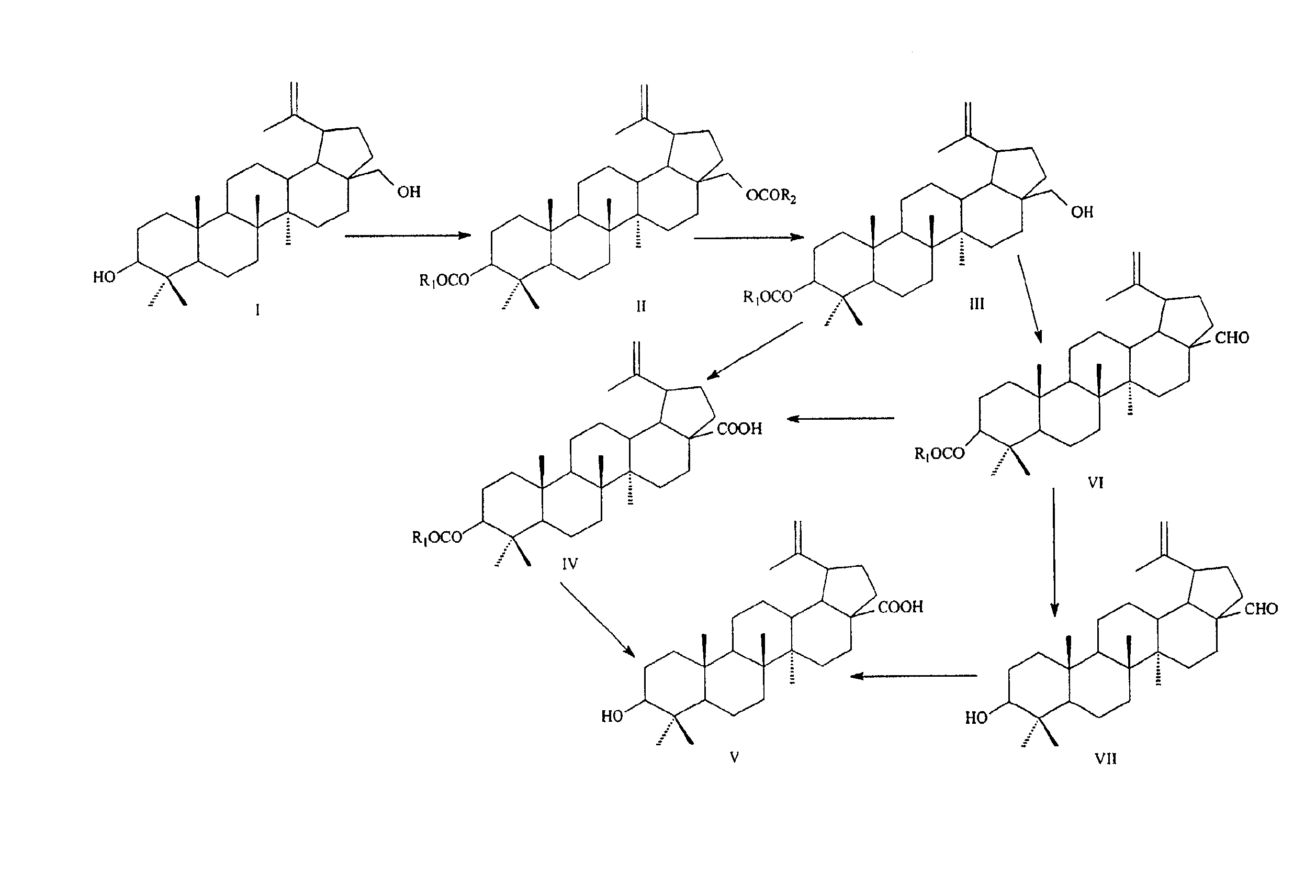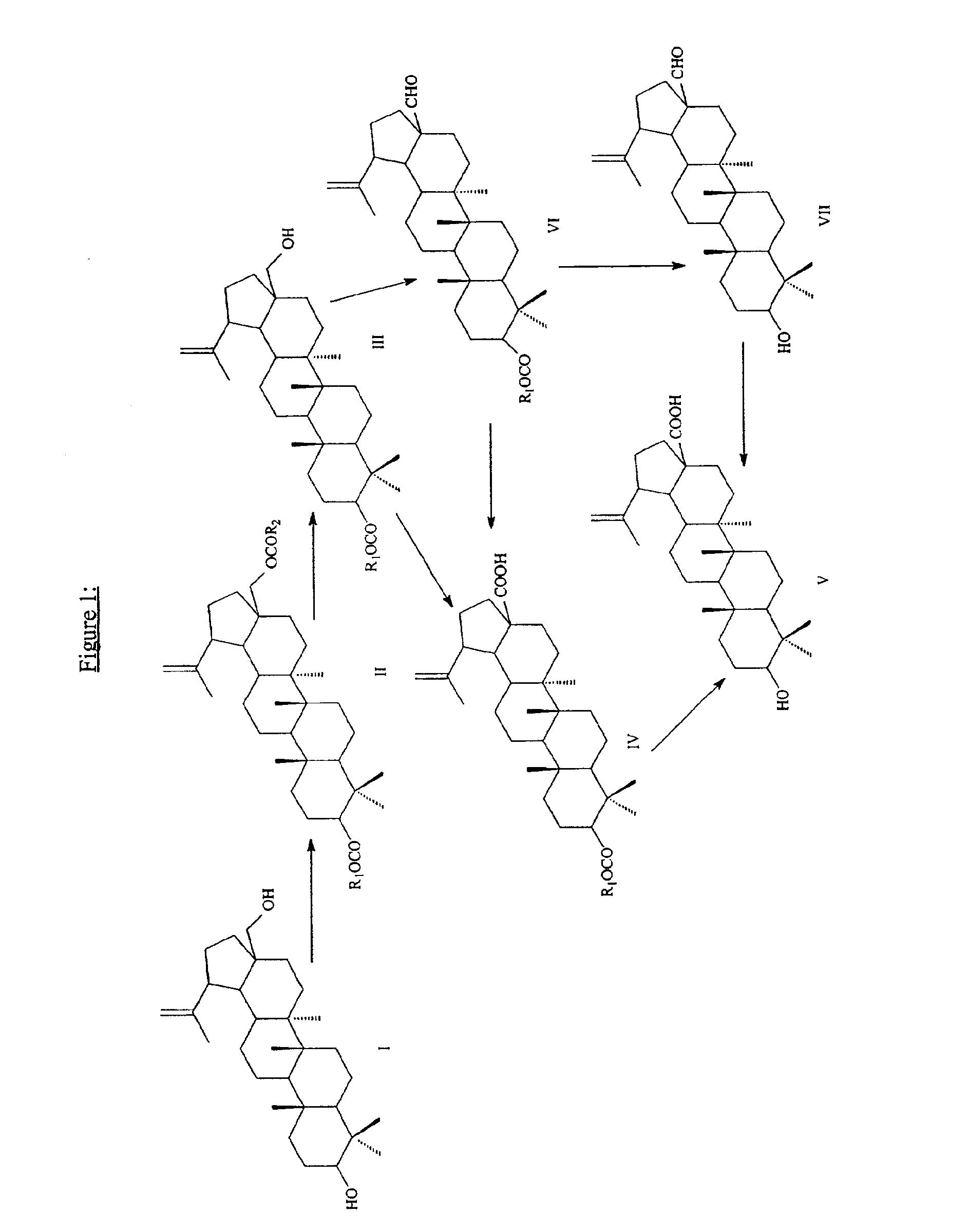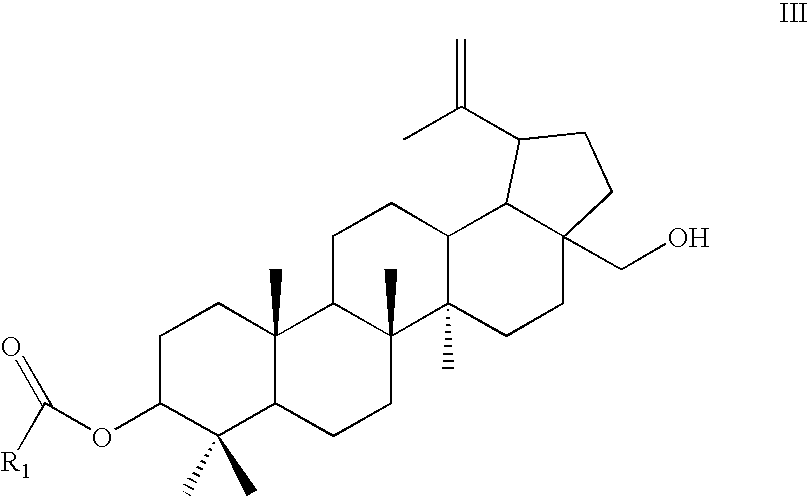Methods for manufacturing betulinic acid
a technology of betulinic acid and manufacturing methods, which is applied in the preparation of carboxylic compounds, fatty acid chemical modifications, carbonyl compounds, etc., can solve the problems of unsatisfactory commercial scale (e.g., kilogram) production of betulinic acid, unfavorable disclosure of purification steps, and high cost of process solvents and reagents, etc., to achieve less toxic, less time, and less cost
- Summary
- Abstract
- Description
- Claims
- Application Information
AI Technical Summary
Benefits of technology
Problems solved by technology
Method used
Image
Examples
example 1
Betulin-3-acetate (III)
Acetic anhydride (85 ml) and acetic acid (800 ml) are introduced into round bottom flask (3 L). Betulin (I) (100 g, 0.2259 mol) is added to the stirred solution and refluxed for 3 hours. The reaction mixture is allowed to cool to 50° C. and acetic acid was evaporated under reduced pressure (25-30 mm Hg). Cream-white crystals of intermediate betulin-3,28-diacetate (II) are obtained after storage in vacuo.
Isopropanol (i.e., i-PrOH) (2.5 L) and powdered boron iso-propoxide (i.e., B(O-i-Pr)3) (100 g, 0.223 mol) are added to the flask and the mixture is refluxed for 1.5 hours. Isopropyl alcohol is then removed under reduced pressure (100 mm Hg) at 30-33° C. The resulting white-orange crystals are dissolved in dichloromethane (1 L) and water (60 ml) is added to the solution. After stirring (10-15 minutes) the precipitated material is filtered, extracted with dichloromethane (4×200 ml) and dried over sodium sulfate (10 g). Solvent evaporation provides white crystals....
example 2
Betulinic aldehyde-3-acetate (VI)
Oxalyl chloride (15.72 g, 0.1237 mol) in methylene chloride (i.e., CH2Cl2) (500 ml) is placed in a round bottom two-neck flask (2 L). After cooling to −50 to −60° C. (dry ice bath) and with efficient stirring is added dimethylsulfoxide (i.e., DMSO) (12.87 g, 0.165 mol) in methylene chloride (500 ml) drop-wise over 5 to 10 minutes. The mixture is stirred for an additional 5 to 10 minutes (until gas evolution stops). Betulin-3-acetate (III) (powdered) (0.0825 mol, 40 g) is then added and allowed to stand for 45 minutes. After triethylamine (41.67 g, 0.4126 mol) is added, the cooling bath is removed and temperature allowed to increase to 10° C. Cold water (200 ml) is added and the mixture is extracted with methylene chloride (3×100 ml). The combined organic extracts are washed with water (5×100 ml), 5% HCl (2×100 ml) and brine (2×100 ml). After drying over sodium sulfate (10 g), evaporation of the solvent gives crude compound, which after crystallizatio...
example 3
Betulinic aldehyde-3-acetate (VI)
Oxalyl chloride (7.86 g, 62 mmol) in trifluoromethylbenzene (250 ml) is placed in a round bottom two-neck flask (2 L). After cooling to −30 to −35° C. (i-PrOH-dry ice bath) and with efficient stirring is added dimethylsulfoxide (6.44 g, 83 mmol) in trifluoromethylbenzene (250 ml) drop-wise over 5 to 10 minutes. The mixture is stirred for an additional 5-10 minutes (until gas evolution stops). Powdered 3-O-acetyl-betulin (III) (40 g, 41 mmol) is then added. The resulting mixture is allowed to stand for 45 minutes. After triethylamine (41.67 g, 206 mmol) is added, the cooling bath is removed and the temperature is allowed to increase to 10° C. Cold water (100 ml) is added and the mixture is extracted with trifluoromethylbenzene (3×50 ml). The combined organic extracts are washed with water (5×50 ml), 5% HCl (2×50 ml) with brine (2×50 ml). After drying over sodium sulfate (5 g), evaporation of the solvent gives crude compound, which after crystallizatio...
PUM
 Login to View More
Login to View More Abstract
Description
Claims
Application Information
 Login to View More
Login to View More - R&D
- Intellectual Property
- Life Sciences
- Materials
- Tech Scout
- Unparalleled Data Quality
- Higher Quality Content
- 60% Fewer Hallucinations
Browse by: Latest US Patents, China's latest patents, Technical Efficacy Thesaurus, Application Domain, Technology Topic, Popular Technical Reports.
© 2025 PatSnap. All rights reserved.Legal|Privacy policy|Modern Slavery Act Transparency Statement|Sitemap|About US| Contact US: help@patsnap.com



